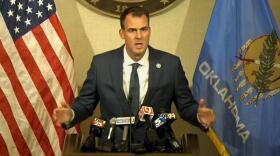Oklahoma will have $574 million more to spend in fiscal year 2020, which begins in July.That’s 7.5 percent more than the current fiscal year, but half a percent less than estimates from Dec.Those estimatesdid not account for decreasing oil prices, which plunged nearly 40 percent from Oct. to Dec.
The Office of Management and Enterprise Services, which certified the numbers on Wednesday, warned revenue collections will slow in 2020, urging lawmakers to spend cautiously.
Following the certification, Gov. Kevin Stitt reiterated he wants to use extra revenue to shore up state savings. Upon taking office,Stitt saidhehopes to build state savings up to $1 billion by the end of fiscal year 2020. The rainy day fund currently sits at $874 million, and Stitt is asking the legislature to set aside $250 million from projected revenue growth.
Stitt’s cabinet is also focused on adding to the Revenue Stabilization Fund, which was created in 2016 tohelp the state weather future economic downturns. Unlike theRainy Day Fund, the RSF is designed to grow when collections from the gross production taxes on oil and gas, and the corporate income tax, state’s most volatile revenue sources, exceed recentaverages. Lawmakers raised the threshold for despositing into the RSF in 2018.
“It's important going into the next two fiscal years that we build a state budget that is sustainable. While we did not meet the threshold for money to be deposited into the new Revenue Stabilization Fund this year, it is very likely that a large deposit will happen next fiscal year," said Secretary of Budget Mike Mazzei. “This deposit could be hundreds of millions of dollars, which means there could be no growth revenue in FY 2021."
Republican lawmakers have said extra money needs to go to existing state obligations. Democrats, however, want to spend $150 million more on classroom funding and expand Medicaid, a $100 million dollar investment.
Copyright 2019 KGOU







